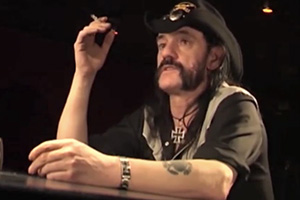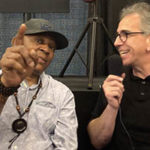The legacy of Lemmy lives on
By Jon Liebman
Week of December 21, 2020
If you’re a regular reader of my blog, you know I’m all about how the role of the bass player is, for the most part, a supportive role, laying down the foundation for the band.
Sometimes, though, a bass player comes along who, in addition to “just” supporting the band, attains iconic status as well.
In this week’s interview, FBPO contributor Gary Graff goes one-on-one with Motörhead guitarist Phil Campbell, who looks back on the life and career of the one and only Lemmy Kilmister, as we approach the five-year anniversary of the iconic Motörhead frontman’s passing.
What makes a bass icon?
In some cases, it’s unadulterated bass chops (Jaco Pastorius, Stanley Clarke). Or it could be crooning and songwriting (Peter Cetera, Sting), brash, fearless marketing (Gene Simmons), or just being a rock star (Geddy Lee).
In Lemmy’s case, it was how he always injected his bigger-than-life personality into everything he did, including his full-throttle bass playing. “Nobody plays bass like that,” Campbell says. “You’re playing chords and he’s whacking it with a plectrum and it’s loud as shit.”
Lemmy seemed to pour his heart and soul into everything, including playing bass. “It was just a unique technique,” Campbell continues, “and totally in the pocket. That’s what used to keep us on time every night.”
Anyone who achieves that level of status is bound to leave some kind of legacy. What do people think of when they hear Lemmy’s name? Is it his belting out “Ace of Spades” like nobody else could ever do? Maybe it’s picturing him enjoying one of his signature “Jack & Coke” cocktails.
“I want him to be remembered as a strong, healthy character,” says Campbell. “He was great. He was always on the money when he played since day one. That never changed.”
Playing well is important for any bassist. Sometimes bass players are remembered for more than their bass playing. Lemmy is one of those people.
How about you? Have a thought on the subject? Leave a comment below and let me know what you think. In the meantime, check out Gary’s interview with Phil here.






ICON
An icon in any discipline is supposed to be a person worthy of veneration.
Wow, how does anyone determine that because it is like the word ‘genius’, it is an opinion-based perception, sadly too often after the person has passed away.
So it is opinion basically, whether an educated opinion or not.
Based on that I have to look at it like Mozart as in who made a contribution to not just the bass but music as a whole that will be remembered centuries later? No a great deal fit that, Serge Koussivitsky, Dominic Dragonetti, Gary Karr, Francois Rabbath, Jaco Pastorius and Stanley Clarke. As great as many hundreds of bassists, perhaps even thousands who followed them were or are respectively, they are only in my opinion, development on those aforementioned bassists, who not only added something to the bass whether upright or electric, but also to music itself.
They created something not seen or heard before in any shape of form.
Those after, notsomuch.